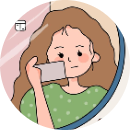Câu 1. Hoa: “How well you are playing!” Mai: “___________________”
A. Say it again. I like to hear your words. B. I think so. I’m proud of myself.
C. Really? I’ve got it. D. Many thanks. That’s a nice compliment.
Câu 2. There’s nothing good on TV. Why don’t you turn it___________?
A. on B. down C. off D. up
Câu 3. Mr. Long asked me if I___________ a new bike the following day.
A. buy B. will buy C. bought D. would buy
Câu 4. My brother is very___________ of spiders.
A. terror B. terrify C. terrified D. terrifying
Câu 5. The man___________ to your sister is my uncle.
A. is talking B. was talking C. talking D. talked
Câu 6. It’s no use___________ a language if you don’t try to use it.
A. to learn B. learned C. learning D. learn
Câu 7. ___________ his mental illness, the boy can’t keep pace with his classmates.
A. Although B. Despite C. Because D. Because of
Câu 8. The government should do something to help___________.
A. the poors B. the poor ones C. poor D. the poor
Write the letter A, B, C, or D to indicate the word whose underlined part is pronounced differently front that of the rest in each of the following questions.
Câu 9. A. though B. throw C. Through D. thought
Câu 10. A. hopes B. laughs C. behaves D. outskirts
Write the letter A, B, C or D on your answer sheet to indicate the option that needs correcting
Câu 11. A cure for the common cold, causing by a virus, has not been found.
A. causing B. for C. a virus D. has not
Câu 12. Today was such beautiful day that I couldn’t bring myself to complete all my chores.
A. myself B. such beautiful C. my chores D. to complete
Write the letter A, B, C or D on your answer sheet to indicate the sentence that is closest in meaning to each of the given ones
Câu 13. He started learning French six years ago.
A. He has learned French for six years. B. It was six years ago did he start learning French. C. He hasn’t learnt French for six years. D. It is six years since he has learnt French.
Câu 14. “Why don’t you get your hair cut, Gavin?” Said Adam .
A. Adam advised Gavin to cut his hair.
B. Gavin was suggested to have a haircut.
C. It was suggestible that Adam get Gavin’s haircut.
D. Adam suggested that Gavin should have his haircut.
Câu 15: I am very interested in the book you lent me last week.
A. The book is interesting enough for you to lend me last week.
B. It was the interesting book which you lent me last week.
C. The book which you lent me last week is too interesting to read.
D. The book that you lent me last week interests me a lot
Read the following passage and choose the correct answer (A, B, C or D) to fill in each of the blank spaces below
Intelligence tests have been used for many years to judge people's Intelligence Quotient, or IQ. A (16) ________more recent invention, but one which is gaining in popularity, is the measuring of Emotional Intelligence, known as EQ. Emotional Intelligence is divided (17) ________five areas: self-awareness - recognizing your own feelings; managing emotions - handling your feelings in an appropriate way, and dealing with negative emotions well; motivating oneself - this (18) ________things like self-control, and using your emotions to achieve goals; empathy - understanding other people's feelings, and seeing their point of view; and handling relationships - your social skills, and how well you emotionally interact with other people. Many people believe that your Emotional Intelligence is more (19) ________than any other intelligence, and is a better predictor of how successful you will be in work, and in life. Some employers have even started giving EQ (20) ________to job applicants
Câu 16. A. much B. very C many. D. lot
Câu 17. A to. B into. C for. D. with
Câu 18. A consists. B. has C. gets D. includes
Câu 19. A important. B importance. C unimportant. D. unimportance
Câu 20. A. exams B. checks C tests. D. proofs
Read the passage and choose the correct answer (A, B, C, or D)
The search for alternative sources of energy has led in various directions. Many communities are burning garbage and other biological waste products to produce electricity. Converting waste products to gases or oil is also an efficient way to dispose of waste.
Experimental work is being done to derive synthetic fuels from coal, oil shale and coal tars. But to date, that process has proven expensive. Other experiments are underway to harness - power with giant windmills. Geothermal power, heat from the earth, is also being tested.
Some experts expect utility companies to revive hydroelectric power derived from streams and rivers. Fifty years ago hydroelectric power provided one third of the electricity used in the United States, but today it supplies only four percent. The oceans are another potential source of energy. Scientists are studying ways to convert the energy of ocean currents, tides, and waves to electricity. Experiments are also underway to make use of the temperature differences in ocean water to produce energy.
Câu 21. Which is the best title of the passage?
A. Efficient Ways of Disposing of Waste B. The Use of Water Productions for Energy
C. The Search for Alternative Sources of Energy D. New Discoveries in Geothermal Power
Câu 22. Which of the following is NOT mentioned in the passage as an alternative source of energy?
A. Burning of garbage B. Geothermal power C. Synthetic fuels D. Electricity
Câu 23. According to the author, the impracticability of using coal, oil shale and coal tars as sources of energy is due to ___________ .
A. their being time consuming B. their being money consuming
C. the scarcity of sources D. the lack of technology their being money consuming
Câu 24. The word “it” in the last paragrph refers to ____.
A. alternative source B. the United States C. hydroelectric power D. Electricity
Câu 25. What can be inferred from the last paragraph?
A. Hydroelectric power will be the main source of energy
B. Synthetic fuels will be the principal source of alternative energy
C. Alternative energy will come from a variety of sources
D. All alterenative production of energy will be delivered from water.
Read the following passage and choose the correct answer (A, B, C or D) to fill in each of the blank spaces below
Speech is one of the most important ways of communicating .It consists of far more than just making noises . To talk and also to (26)_______ by other people, we have to speak a language ,that is, we have to use combinations of sounds that everyone agrees to stand for a particular object or idea. Communication would be impossible if everyone made up their own language. Learning a language properly is very(27)_______. The basic (28)_______of English is not very large, and only about 2,000 words are needed to speak it quite (29)________.But the more idea you can express, the more precise you can be about their exact meaning. Words are the main thing we use in communicating what we want to say. The way we(30)_________the words is also very important. Our tone of voice can express many emotions and show whether we are pleased or angry, for instance.
Câu 26. A. be spoken B. be examined C. be understood D. be talked
Câu 27. A. easy B. important C. simple D. expensive
Câu 28. A. grammar B. word C. vocabulary D. structure
Câu 29. A. fluent B. good C. well D. perfect
Câu30. A. talk B. say C. pass D. send



















